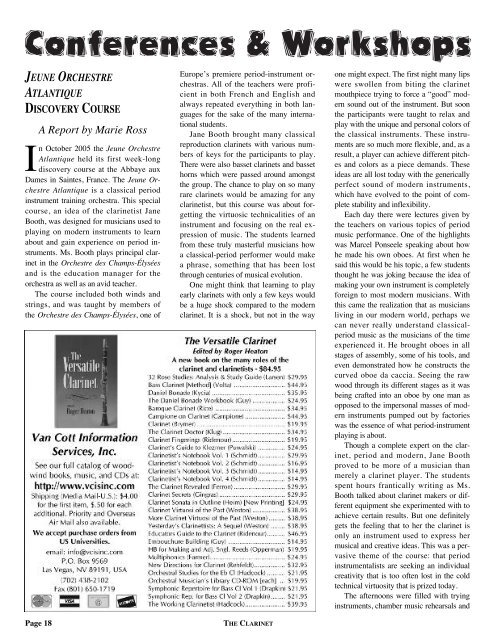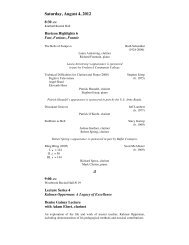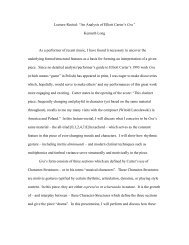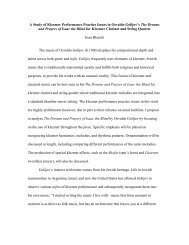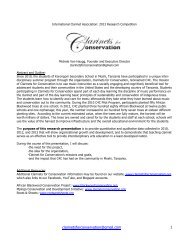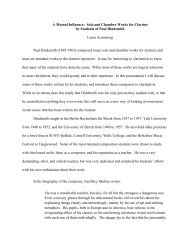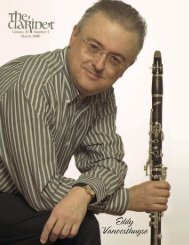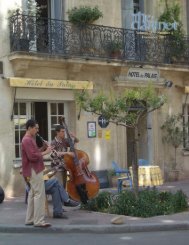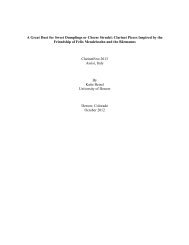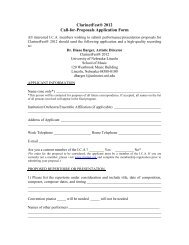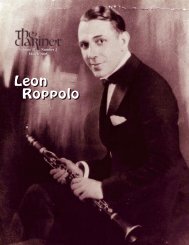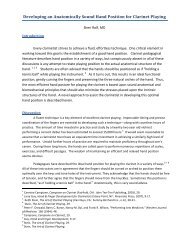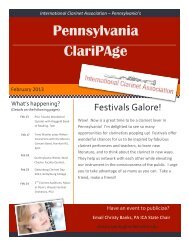Volume 33 Number 3 June 2006 - International Clarinet Association
Volume 33 Number 3 June 2006 - International Clarinet Association
Volume 33 Number 3 June 2006 - International Clarinet Association
- No tags were found...
You also want an ePaper? Increase the reach of your titles
YUMPU automatically turns print PDFs into web optimized ePapers that Google loves.
JEUNE ORCHESTRE<br />
ATLANTIQUE<br />
DISCOVERY COURSE<br />
A Report by Marie Ross<br />
In October 2005 the Jeune Orchestre<br />
Atlantique held its first week-long<br />
discovery course at the Abbaye aux<br />
Dames in Saintes, France. The Jeune Or -<br />
chestre Atlantique is a classical period<br />
instrument training orchestra. This special<br />
course, an idea of the clarinetist Jane<br />
Booth, was designed for musicians used to<br />
playing on modern instruments to learn<br />
about and gain experience on period in -<br />
struments. Ms. Booth plays principal clarinet<br />
in the Orchestre des Champs-Ély sées<br />
and is the education manager for the<br />
orchestra as well as an avid teacher.<br />
The course included both winds and<br />
strings, and was taught by members of<br />
the Orchestre des Champs-Élysées, one of<br />
Page 18<br />
Europe’s premiere period-instrument or -<br />
chestras. All of the teachers were proficient<br />
in both French and English and<br />
always repeated everything in both languages<br />
for the sake of the many international<br />
students.<br />
Jane Booth brought many classical<br />
reproduction clarinets with various numbers<br />
of keys for the participants to play.<br />
There were also basset clarinets and basset<br />
horns which were passed around amongst<br />
the group. The chance to play on so many<br />
rare clarinets would be amazing for any<br />
clarinetist, but this course was about forgetting<br />
the virtuosic technicalities of an<br />
instrument and focusing on the real ex -<br />
pression of music. The students learned<br />
from these truly masterful musicians how<br />
a classical-period performer would make<br />
a phrase, something that has been lost<br />
through centuries of musical evolution.<br />
One might think that learning to play<br />
early clarinets with only a few keys would<br />
be a huge shock compared to the modern<br />
clarinet. It is a shock, but not in the way<br />
THE CLARINET<br />
one might expect. The first night many lips<br />
were swollen from biting the clarinet<br />
mouthpiece trying to force a “good” modern<br />
sound out of the instrument. But soon<br />
the participants were taught to relax and<br />
play with the unique and personal colors of<br />
the classical instruments. These instruments<br />
are so much more flexible, and, as a<br />
result, a player can achieve different pitches<br />
and colors as a piece demands. These<br />
ideas are all lost today with the generically<br />
perfect sound of modern instruments,<br />
which have evolved to the point of complete<br />
stability and inflexibility.<br />
Each day there were lectures given by<br />
the teachers on various topics of period<br />
music performance. One of the highlights<br />
was Marcel Ponseele speaking about how<br />
he made his own oboes. At first when he<br />
said this would be his topic, a few students<br />
thought he was joking because the idea of<br />
making your own instrument is completely<br />
foreign to most modern musicians. With<br />
this came the realization that as musicians<br />
living in our modern world, perhaps we<br />
can never really understand classicalperiod<br />
music as the musicians of the time<br />
experienced it. He brought oboes in all<br />
stages of assembly, some of his tools, and<br />
even demonstrated how he constructs the<br />
curved oboe da caccia. Seeing the raw<br />
wood through its different stages as it was<br />
being crafted into an oboe by one man as<br />
opposed to the impersonal masses of modern<br />
instruments pumped out by factories<br />
was the essence of what period-instrument<br />
playing is about.<br />
Though a complete expert on the clarinet,<br />
period and modern, Jane Booth<br />
proved to be more of a musician than<br />
merely a clarinet player. The students<br />
spent hours frantically writing as Ms.<br />
Booth talked about clarinet makers or different<br />
equipment she experimented with to<br />
achieve certain results. But one definitely<br />
gets the feeling that to her the clarinet is<br />
only an instrument used to express her<br />
musical and creative ideas. This was a pervasive<br />
theme of the course: that period<br />
instrumentalists are seeking an individual<br />
creativity that is too often lost in the cold<br />
technical virtuosity that is prized today.<br />
The afternoons were filled with trying<br />
instruments, chamber music rehearsals and


